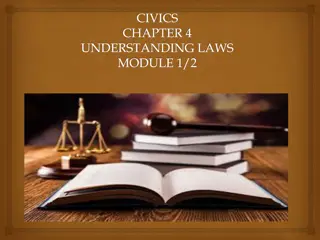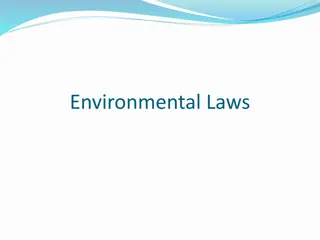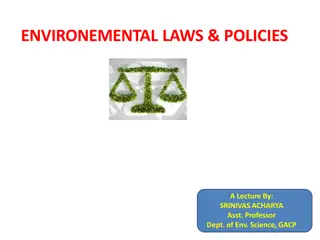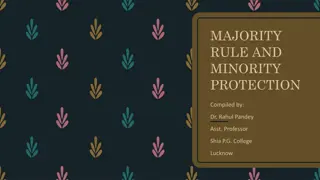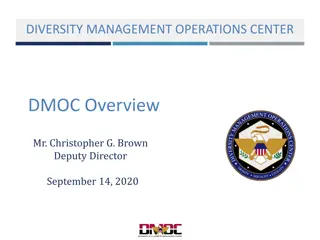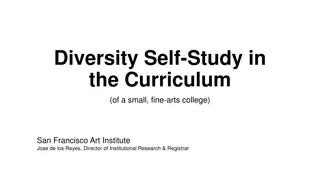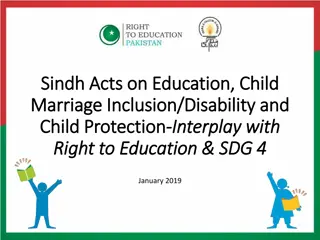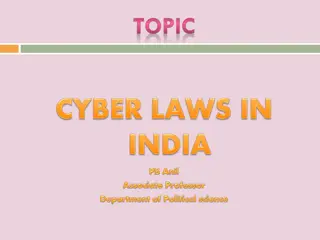Minority Protection Laws in India: Safeguarding Diversity
India's rich diversity poses the need for robust laws to protect minority communities, ensuring their rights and safeguarding their customs. The Constitution of India upholds secularism and equality, providing provisions to safeguard minority rights and prevent discrimination based on religion, caste, or language. Through various constitutional articles, minority communities are granted the freedom to practice and propagate their beliefs while managing their religious affairs and properties.
Download Presentation

Please find below an Image/Link to download the presentation.
The content on the website is provided AS IS for your information and personal use only. It may not be sold, licensed, or shared on other websites without obtaining consent from the author. Download presentation by click this link. If you encounter any issues during the download, it is possible that the publisher has removed the file from their server.
E N D
Presentation Transcript
SOCIOLOGY SUSMITA ROY 11.08.21 Minority Protection Laws in India
India has always embraced diversity, becoming a vast ocean of cultures, religions, ethnicities, beliefs and practices. With such diversity, it becomes necessary to give each community their due, without inciting any conflicts. This plethora of diversity in our democratic nation makes the minority communities at times vulnerable, calling for sturdy laws to protect their rights. Moreover, it becomes the duty of the state to ensure that human rights are available to all citizens, irrespective of caste, colour, or creed. The Constitution of India strives to achieve a harmony between all the communities by ensuring justice, social, economic or political to all citizens and declaring itself to be a secular state. While certain laws are applicable to all Indian citizens, there are personal laws that apply to certain communities only, preserving their customs and beliefs. Minority rights protection in India has always been in limelight with political parties garnering votes of various communities through triggering their emotions upon their minority status.
The term minority, in general context, is used to refer to non-Hindu communities in India, though there are various other implications of this term. Minorities can be classified according to their religion as well as language spoken, caste, tribal status and so forth. But the minority communities as recognised by the government of India are Muslims, Christians, Sikhs, Buddhists, Zoroastrians and Jains as under Section of the National Commission for Minorities (NCM) Act, 1992. But the term minority has neither been defined in the act nor the Constitution, and there is no widely accepted definition of the term globally. Population and religion have been the factors which have decided the scope of the minority status in India. Minority Rights Under The Indian Constitution Under the Constitution of India, there are various provisions to safeguard the rights of minorities. Preamble of the Constitution declares India to be a secular state. Article 15 prohibits any sort of discrimination on the grounds of race, religion, caste, sex, descent, place of birth or residence. Article 16 also prohibits any sort of discrimination when it comes to public employment, on the basis of religion, caste, language, race and so on. This guarantees equal employment opportunities to all the Indian citizens in case of government offices.
The right to profess, practice and propagate any religion has been guaranteed to every person as a fundamental right under Article 25 of the Indian Constitution. This article allows the minority communities to follow their beliefs and practices without any hindrance as long as it does not hamper public order, morality and health of any person. But the State can regulate the secular activities related to religious practices such as financial, political, economic activities. Article 26 gives the freedom to the religious denominations or any such sections to manage their own religious affairs including managing institutions for religious and charitable purposes; owning, acquiring and administering movable and immovable property.Again, this right is subject to public order, morality and health. Article 27 prohibits any compulsion on citizens to pay taxes, proceeds of which are to be appropriated in promotion of any particular religion. Article 28 prohibits state funded educational institutions from providing religious instructions unless there is a requirement in the terms of the endowment or trust, by which the institution has been established, regarding imparting such religious instruction. It also gives the person attending any educational institution the right to not participate in any religious instruction imparted by the institute.
Article 29 of the Constitution provides the citizens with the right to conserve their language, script and culture; as well as guarantees that they would not be denied admission into any educational institution based on their race, language, religion or caste. This right is provided to any section of the society, whether it has been recognised as a minority by the State or not. Article 30 is pivotal to the protection of minority rights in India. It provides the minorities the right to establish and administer educational institutions and the State has been prohibited from any discrimination in matters of granting aids to such institutions. But these educational institutions can be regulated by the State. Although this article uses the term minorities , it has not been given any definition by the Indian Constitution. The judiciary has tried to dwell upon this matter in various cases.
National Commission for Minorities The National Commission for Minorities was established by the National Commission for Minorities Act, 1992 to protect minority rights in the country. The commission consists of one chairperson and six members representing the six minor communities Muslims, Sikhs, Buddhists, Christians, Parsis and Jains. The Commission performs various functions including evaluating the development of minority communities under Union and States, ensuring the safeguard of minority rights as per the Constitutional laws and other legislations, conducting studies and researches on the matters related to minorities and suggesting measures to Government on these aspects. The commission also acts grievance redress forum for persons belonging to minority communities. The commission calls for reports from concerned authorities after taking cognizance of complaints. These reports are studied and then recommendations are made by the commission. These recommendations are not legally binding upon the authorities but State takes them seriously and implements them. This Commission functions as a civil court in the matters concerning summoning of witnesses, discovery and production of documents; it receives evidence of affidavits, requisitions public records and copies, issues commission for examination of witnesses and documents, and any other prescribed matter in manner same as the civil courts.
Apart from these, the linguistic minorities can take up their grievances to the Commissioner for Linguistic Minorities that was established in 1957 to comply Article 350 B of the Constitution. The office of Commissioner submits annual report to the government.
POPULATION TRANSFER OR RELOCATION Population transfer is the movement of a large group of people from one region to another by state policy or international authority, of ethnicity or religion. Often the affected population is transferred by force to a distant region, perhaps not suited to their way of life, causing them substantial personal and bodily harm and resulting in significant damage and loss of property. Population exchange is the transfer of two populations in opposite directions at about the same time. These exchanges have taken place several times in the 20thcentury, such as during the 1947 partition of India and Pakistan. most frequently on the basis
1947 Partition of India Figure showing the movement of refugees following the decision by colonial Britain to partition India based on religious demographics.
Main Problems faced by Minorities In India Some of the main problems faced by minorities in India are as follows: 1. Problem of Identity 2. Problem of Security 3. Problem Relating to Equity. 1. Problem of Identity: Because of the differences in socio-cultural practices, history and backgrounds, minorities have to grapple with the issue of identity everywhere which give rise to the problem of adjustment with the majority community. 2. Problem of Security: Different identity and their small number relative to the rest of the society develops feeling of insecurity about their life, assets and well-being. This sense of insecurity may get accentuated at times when relations between the majority and the minority communities in a society are strained or not much cordial. 3. Problem Relating to Equity: The minority community in a society may remain deprived of the benefit of opportunities of development as a result of discrimination. Because of the difference in identity, the minority community develops the perception of the sense of inequity.
So far as the problems of Muslims are concerned, which is the largest minority community in India, they fall into three categories: (a) Problems those are common to all poor people. (b) Problems those are common to all minorities. (c) Problems those are specific to Muslims only. Here, we will deal especially the third category which is specific to Muslims only. Religion is a complex phenomenon in India. Though India is declared a secular state, yet the problem of secularism looms large here. Conversion to Islam and Christianity has been a much controversial issue over the last couple of decades. Reasons for this are varied ranging from poverty to perceived discrimination resulting in alienation of Muslims and Christians in India. The Government of India has constituted a committee on 9th March 2005 under the chairmanship of justice Rajendra Sacchar to enquire and analyse the problems faced especially by Muslims in India.
The Indian socio-economic fabric is very complex because it is much affected by caste, religion and all the more regional/linguistic differentials. At the same time, the Indian economic, social and political institutions which are persisting since centuries have a historical basis also. These factors have given a unique character to Indian society. It has become a conglomeration of various layers and segments divided and sub-divided. Secularism does not signify anti-religion. In India people fervently believe in their respective religions and overwhelming number of persons of all communities give equal respect to the religion of others. Secularism signifies giving equal dignity and respect to all religions. Of course it goes without saying that Indian State has no religion of its own, nor for that matter can any religion claim superiority over another religion as by resorting to false premise that any religion in the country is indigenous while others are foreign. This is heresy not permitted by our Constitution, which gives equal reverence to all the religions practiced by various communities of India. The Supreme Court of India has said that the concept of secularism is that the State will have no religion of its own.
The specific claim that tolerance is a specialand very nearly uniquefeature of Western civilization, extending way back into history, is particularly hard to sustain. This is not to deny that tolerance and liberty are among the important achievements of modern Europe (despite some aberrations, such as brutal imperialist rules over two centuries and the Nazi atrocities six decades ago). The world indeed has much to learn from the recent history of Europe and the Western world, particularly since the period of European Enlightenment but to see a unique line of historical division there is remarkably fanciful. The history of the world does not suggest anything like a division between a long-run history of Western and that of non-Western despotism. All persons are equal before the law and are entitled without any discrimination to the equal protection of the law. In this respect, the law shall prohibit any discrimination and guarantee to all persons equal and effective protection against discrimination on any ground such as race, colour, sex language, religion, political or other opinion national or social origin, property, birth or other status.
But, much earlier founding fathers/mothers of Indian Constitution with their vision to secure to all its citizen justice, liberty equality and fraternity so provided the rights for the minorities. Thus Fundamental Right Chapter in Part III of our Constitution specifically provides vide Articles 25 to 30 the various rights and privileges for the minorities such as: 1. Freedom of conscience and free profession, practice and propagation of religion. 2. Freedom to manage religious affairs. 3. Freedom as to payment of taxes for promotion of any particular religion. 4. Freedom as to attendance at religious instruction or religious worship in certain educational institutions. 5. Protection of interests of minorities. 6. Rights of minorities to establish and administer educational institutions.
The minorities, many a time, may feel that there is discrimination against them in the matter of employment, housing, for obtaining loans from the public or private sector banks, or opportunities for good schooling. It is self evident that if minorities have these perceptions, law must provide an effective mechanism which should examine their complaints and be able to give effective relief. It is imperative that if the minorities have certain perceptions of being aggrieved, all efforts should be made by the state to expeditiously. This sensitivity is natural and may exist among religious minorities in any country. Recognizing this reality is not pandering to the minorities nor sniping at the majority. This recognition is only an acceptance of reality. It is a well accepted maxim in law that not only must justice be done but it must appear to be done.
causes and consequences of prejudice and discrimination in society Prejudice makes the victim feel less than fully human. When people are undervalued by others, their self-esteem suffers and they stop trying to improve themselves. Prejudice can often lead to bullying and other forms of discrimination . Prejudice makes the victim feel less than fully human. When people are undervalued by others, their self-esteem suffers and they stop trying to improve themselves. Prejudice can often lead to bullying and other forms of discrimination. These create an atmosphere of fear for what might happen at any moment and fear for what the future might hold. In extreme cases this can lead a person to take their own life. At its worst extremes, prejudice can lead to genocide, as demonstrated during World War Two, with the extermination of 6 million Jewish people. This is an example of what can happen when prejudice is allowed to develop unchallenged in society. The consequences of prejudice and discrimination can lead to individuals and entire communities feeling vulnerable, frightened and worthless. At worst, the result can be death.
Positive discrimination Not all discrimination is a bad thing. In the last 30 years, laws have been passed to create better access to buildings for people with disabilities. Some companies have set minimum quotas for the number of women in positions of authority. These types of actions are aimed at showing that people who have suffered prejudice in the past are fully able to fulfil a major role in society given the chance. positive discrimination One example of of homosexual officers. The reason for this has been to ensure that homosexuals are not under-represented in the force. However, this could lead to heterosexual potential recruits feeling over-looked and to homosexual recruits feeling they have not been selected on their merits. is the UK police force recruitment
REFERENCES RAM AHUJA INDIAN SICIETY C.N.RAO GOOGLE SCHOLAR



























